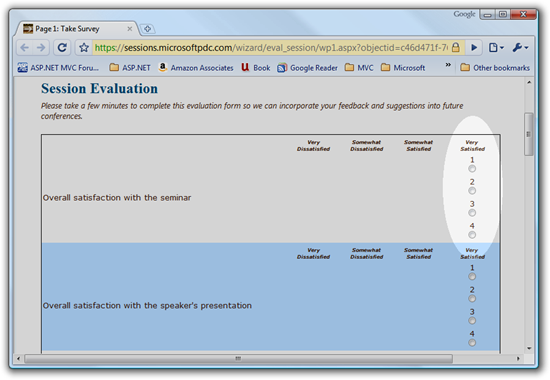Browser Choice and Voting Online
In my last post, I joked that the reason that someone gave me all 1s in my talk was a misunderstanding of the evaluation form. In truth, I just assumed that someone out there really didn’t like what I was showing and that’s totally fine. It was something I found funny and I didn’t really care too much.
But I received a message from someone that they tried to evaluate the session from the conference hall, but the evaluation form was really screwy on their iPhone. For example, here’s how it’s supposed to look in IE.
I checked it out with Google Chrome which uses WebKit, the same rendering engine that Safari, and thus the iPhone, uses.
Here it is (click to see full size).
Notice anything different? :)
The good news here is that nothing really at stake here for me, as speaking is a perk of my job, not a requirement. It doesn’t affect my reviews. I’d bet this form has been in use for years and was built long before the iPhone.
However, if we ever start deciding elections online, this highlights one of the subtle design issues the designers of such a ballot would need to address.
It’s not just an issue of testing for the current crop of browsers, it’s also about anticipating what future browsers might do.
Such a form would really need to have simple semantic standards based markup and be rendered in such a way that if CSS were disabled, submitting the form would still reflect the voter’s intention.
For example, it may be hard to anticipate every possible browser rendering of a form. In this case, one fix would be to change the label for the radio buttons to reflect the intention. Thus rather than the number “1” the radio button label would be “1 – Very Dissatisfied”. Sure, it repeats the column information, but no matter where the radio buttons are displayed, it reflects the voter’s intention.
In any case, I think the funny part of this whole thing is when I mentioned this one evaluation score, several people I know all laid claim to being the one who hated my talk. They all want to take credit for hating on my talk, without going through all the trouble of actually submitting bad scores. ;)
If you were at the conference and saw my talk, be sure to evaluate it. And do be kind. :)
UPDATE: Be sure to read John Lam’s account of the PDC as well. He has some great suggestions for conference organizers to improve the evaluation process.


Comments
9 responses